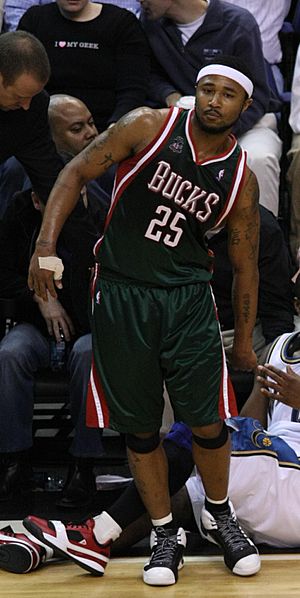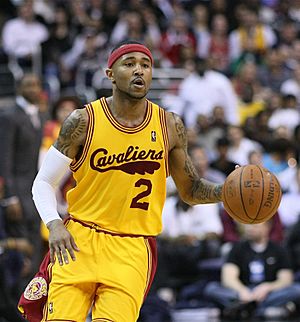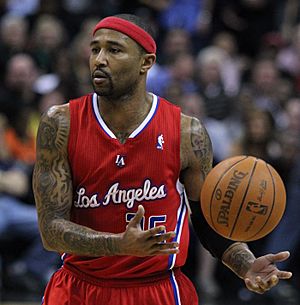Mo Williams facts for kids
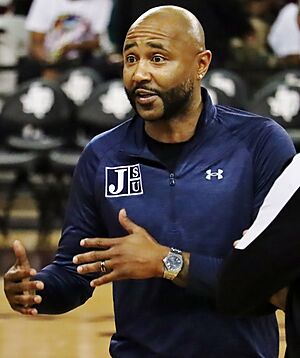
Williams with Jackson State in 2024
|
|
| Jackson State Tigers | |
|---|---|
| Head coach | |
| Personal information | |
| Born | December 19, 1982 Jackson, Mississippi, U.S. |
| High school | Murrah (Jackson, Mississippi) |
| Listed height | 6 ft 1 in (1.85 m) |
| Listed weight | 198 lb (90 kg) |
| Career information | |
| College | Alabama (2001–2003) |
| NBA Draft | 2003 / Round: 2 / Pick: 47th overall |
| Selected by the Utah Jazz | |
| Pro career | 2003–2017 |
| Coaching career | 2018–present |
| League | Southwestern Athletic Conference |
| Career history | |
| As player: | |
| 2003–2004 | Utah Jazz |
| 2004–2008 | Milwaukee Bucks |
| 2008–2011 | Cleveland Cavaliers |
| 2011–2012 | Los Angeles Clippers |
| 2012–2013 | Utah Jazz |
| 2013–2014 | Portland Trail Blazers |
| 2014–2015 | Minnesota Timberwolves |
| 2015 | Charlotte Hornets |
| 2015–2017 | Cleveland Cavaliers |
| As coach: | |
| 2018–2020 | Cal State Northridge (assistant) |
| 2020–2022 | Alabama State |
| 2022–present | Jackson State |
| Career highlights and awards | |
|
|
| Career NBA statistics | |
| Points | 10,759 (13.2 ppg) |
| Rebounds | 2,264 (2.8 rpg) |
| Assists | 3,990 (4.9 apg) |
Maurice "Mo" Williams (born December 19, 1982) is a famous basketball player and coach. He played for 13 seasons in the National Basketball Association (NBA). Today, he is the head coach for the men's basketball team at Jackson State University.
Mo Williams had a great high school career in Jackson, Mississippi. He then played college basketball at the University of Alabama. As a freshman, he helped his team achieve an impressive 27–8 record. They also won a championship in the SEC conference.
After two years at Alabama, Williams joined the 2003 NBA draft. The Utah Jazz picked him as the 47th overall player. During his NBA career, he played for several teams. These included the Milwaukee Bucks, Los Angeles Clippers, and Cleveland Cavaliers. In 2009, he was chosen to be an NBA All-Star. He won his only NBA championship with the Cavaliers in 2016. He stopped playing professionally in 2017.
In May 2018, Williams started his coaching career. He became an assistant coach for the Cal State Northridge Matadors men's basketball team. In May 2020, he became the head coach for the Alabama State Hornets basketball team. He coached there for two seasons. In March 2022, he became the head coach at Jackson State University. This was a special move for him, as it was in his hometown.
Contents
Mo Williams: Basketball Star and Coach
College Days at Alabama
Mo Williams went to college at the University of Alabama. He played under coach Mark Gottfried. In 2002, during his first year, he started every game as the point guard. He scored about 10.4 points and made 4.5 assists per game.
His excellent play helped the Crimson Tide team. They had a fantastic 27–8 record. They also won the SEC regular-season championship. The team entered the NCAA tournament as a high-ranked No. 2 seed. However, they lost in the second round.
In his second season (2003), Williams led the team in scoring and assists. He averaged 16.4 points and 3.8 assists per game. That season ended with a first-round loss in the NCAA tournament. He was recognized as a third-team All-SEC player. After two successful seasons, Williams decided to leave college early. He entered the 2003 NBA draft to become a professional player.
College Statistics
| Legend | |||||
|---|---|---|---|---|---|
| GP | Games played | GS | Games started | MPG | Minutes per game |
| FG% | Field goal percentage | 3P% | 3-point field goal percentage | FT% | Free throw percentage |
| RPG | Rebounds per game | APG | Assists per game | SPG | Steals per game |
| BPG | Blocks per game | PPG | Points per game | Bold | Career high |
| Year | Team | GP | GS | MPG | FG% | 3P% | FT% | RPG | APG | SPG | BPG | PPG |
|---|---|---|---|---|---|---|---|---|---|---|---|---|
| 2001–02 | Alabama | 35 | 35 | 32.0 | .376 | .262 | .857 | 3.9 | 4.5 | 1.7 | 0.1 | 10.4 |
| 2002–03 | Alabama | 29 | 29 | 35.8 | .431 | .317 | .838 | 3.9 | 3.9 | 1.2 | 0.2 | 16.4 |
| Career | 64 | 64 | 33.7 | .405 | .294 | .847 | 3.9 | 4.2 | 1.5 | 0.1 | 13.1 | |
Playing in the NBA
Utah Jazz (2003–2004)
The Utah Jazz picked Mo Williams in the second round of the 2003 NBA draft. He was the 47th player chosen overall. In his first year, called his rookie season, he averaged 5 points and 1.3 assists per game for the Jazz.
Milwaukee Bucks (2004–2008)
On August 8, 2004, the Milwaukee Bucks signed Williams. The Jazz decided not to keep him. When the Bucks' starting point guard, T. J. Ford, was injured, Williams stepped up. He averaged 10.2 points and 6.1 assists during the 2004–05 season.
He became known for making important shots at the end of games. This happened several times in the 2005–06 season. In 2006, the Bucks traded T. J. Ford. This opened a spot for Williams in the starting lineup. In the first 19 games of the 2006–07 season, he had career-high averages. He scored 15.6 points, grabbed 5.1 rebounds, and made 6.2 assists per game.
On December 20, 2006, Williams achieved his first triple-double. This means he had double-digit numbers in three categories. He scored 19 points, had 11 rebounds, and made 10 assists against the Miami Heat. In January 2007, he scored 30 points and made a game-winning shot against the New York Knicks. In the summer of 2007, Williams signed a new six-year deal to stay with the Bucks.
Cleveland Cavaliers (2008–2011)
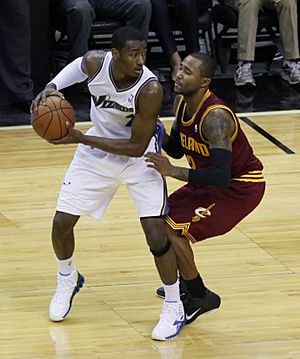
On August 13, 2008, Williams was traded to the Cleveland Cavaliers. This was a big trade involving three teams and six players. When he joined the Cavaliers, he changed his jersey number to #2. His usual #25 was already retired by a former player, Mark Price.
On February 10, 2009, Williams was chosen for the 2009 NBA All-Star Game. He replaced an injured player. The next day, he scored a career-high 44 points against the Phoenix Suns. During the 2008–09 season, Williams helped the Cavaliers have the best record in the league. They won 66 games and lost only 16.
After LeBron James left the Cavaliers, Williams became a strong voice for the team. He showed he wanted to stay with the Cavaliers. He also spoke out about LeBron's departure and comments made by other players. On November 24, 2010, Williams made a game-winning shot for the Cavaliers. It was a 15-foot shot against his old team, the Milwaukee Bucks.
Los Angeles Clippers (2011–2012)
On February 24, 2011, Williams was traded to the Los Angeles Clippers. He immediately became a starter for the Clippers. He improved his scoring and shooting percentages. The next season, the Clippers got Chris Paul and Chauncey Billups. This made Williams the team's "sixth man," meaning he came off the bench. He did well in this role.
Return to Utah Jazz (2012–2013)
On June 29, 2012, Mo Williams was traded back to the Utah Jazz. This was part of a four-team trade.
Portland Trail Blazers (2013–2014)
On August 8, 2013, Williams signed with the Portland Trail Blazers. In November 2013, he was ejected from a game after an argument. He was suspended for one game. He later injured his groin during a playoff game.
Minnesota Timberwolves (2014–2015)
On July 30, 2014, Williams signed a one-year contract with the Minnesota Timberwolves. On January 13, 2015, he had an amazing game. He scored a career-high 52 points against the Indiana Pacers. This broke the team's record for most points in a single game. He was named the Western Conference Player of the Week for his great performance.
Charlotte Hornets (2015)
On February 10, 2015, Williams was traded to the Charlotte Hornets. In his first game for the Hornets, he scored 24 points and made 12 assists. He continued to play well. He was named the Eastern Conference Player of the Week in March. This made him the first player to win this award in both conferences in the same season.
Winning a Championship with Cleveland (2015–2017)
On July 10, 2015, Williams signed a contract to return to the Cleveland Cavaliers. He reunited with LeBron James. In his first game back, he scored 19 points and made 7 assists. He helped fill in for an injured Kyrie Irving.
Williams played well at the start of the season. However, when Kyrie Irving returned from injury, Williams' playing time decreased. He also dealt with his own injuries, including a torn ligament in his thumb. He later had swelling in his left knee.
Williams played limited minutes during the Cavaliers' playoff run in 2016. The team made it to the 2016 NBA Finals. They faced the Golden State Warriors. The Cavaliers fell behind 3–1 in the series. But they made an incredible comeback, winning the series in seven games. They became the first team in NBA history to win the championship after being down 3–1.
On June 14, 2016, Williams decided to stay with the Cavaliers for another season. He later announced he planned to retire from the NBA. However, he never officially signed retirement papers. He remained on the Cavaliers' roster but did not play in the 2016–17 season due to knee surgery. His final NBA game was Game 7 of the 2016 NBA Finals, where the Cavaliers won the championship.
In January 2017, Williams was traded to the Atlanta Hawks. He was then traded to the Denver Nuggets and immediately released. Two days later, he was claimed and released by the Philadelphia 76ers. He was claimed and released again by the Nuggets for similar reasons.
Becoming a Coach
In May 2018, Mo Williams was named an assistant coach for the Cal State Northridge Matadors men's basketball team. This marked the end of his playing career. In May 2020, he became the head coach of the Alabama State Hornets basketball team. He coached there for two years.
On March 9, 2022, he resigned from Alabama State. Just a few days later, on March 14, Williams was named the head coach at Jackson State University. This was a special moment for him, as Jackson State is in his hometown. He replaced Wayne Brent as coach.
Head Coaching Record
| Season | Team | Overall | Conference | Standing | Postseason | ||||
|---|---|---|---|---|---|---|---|---|---|
| Alabama State Hornets (Southwestern Athletic Conference) (2020–2022) | |||||||||
| 2020–21 | Alabama State | 4–14 | 4–14 | 8th | |||||
| 2021–22 | Alabama State | 9–21 | 8–10 | T–8th | |||||
| Alabama State: | 13–35 (.271) | 12–24 (.333) | |||||||
| Jackson State Tigers (Southwestern Athletic Conference) (2022–present) | |||||||||
| 2022–23 | Jackson State | 14–19 | 12–6 | 4th | |||||
| 2023–24 | Jackson State | 15–17 | 11–7 | T–5th | |||||
| 2024–25 | Jackson State | 15–17 | 14–4 | 2nd | |||||
| Jackson State: | 44–53 (.454) | 37–17 (.685) | |||||||
| Total: | 57–88 (.393) | ||||||||
|
National champion Conference regular season champion Conference tournament champion |
|||||||||
NBA Career Statistics
| Legend | |||||
|---|---|---|---|---|---|
| GP | Games played | GS | Games started | MPG | Minutes per game |
| FG% | Field goal percentage | 3P% | 3-point field goal percentage | FT% | Free throw percentage |
| RPG | Rebounds per game | APG | Assists per game | SPG | Steals per game |
| BPG | Blocks per game | PPG | Points per game | Bold | Career high |
Regular Season
| Year | Team | GP | GS | MPG | FG% | 3P% | FT% | RPG | APG | SPG | BPG | PPG |
|---|---|---|---|---|---|---|---|---|---|---|---|---|
| 2003–04 | Utah | 57 | 0 | 13.5 | .380 | .256 | .786 | 1.3 | 1.3 | .5 | .0 | 5.0 |
| 2004–05 | Milwaukee | 80 | 80 | 28.2 | .438 | .323 | .850 | 3.1 | 6.1 | .9 | .1 | 10.2 |
| 2005–06 | Milwaukee | 58 | 12 | 26.4 | .424 | .382 | .850 | 2.5 | 4.0 | .9 | .1 | 12.1 |
| 2006–07 | Milwaukee | 68 | 68 | 36.4 | .446 | .346 | .855 | 4.8 | 6.1 | 1.3 | .1 | 17.3 |
| 2007–08 | Milwaukee | 66 | 66 | 36.5 | .480 | .385 | .856 | 3.5 | 6.3 | 1.2 | .2 | 17.2 |
| 2008–09 | Cleveland | 81 | 81 | 35.0 | .467 | .436 | .912 | 3.4 | 4.1 | .9 | .1 | 17.8 |
| 2009–10 | Cleveland | 69 | 68 | 34.2 | .442 | .429 | .894 | 3.0 | 5.3 | 1.0 | .3 | 15.8 |
| 2010–11 | Cleveland | 36 | 34 | 29.6 | .385 | .265 | .833 | 2.7 | 7.1 | .9 | .3 | 13.3 |
| 2010–11 | L.A. Clippers | 22 | 22 | 32.9 | .422 | .398 | .880 | 2.5 | 5.6 | .9 | .0 | 15.2 |
| 2011–12 | L.A. Clippers | 52 | 1 | 28.3 | .426 | .389 | .900 | 1.9 | 3.1 | 1.0 | .1 | 13.2 |
| 2012–13 | Utah | 46 | 46 | 30.8 | .430 | .383 | .882 | 2.4 | 6.2 | 1.0 | .2 | 12.9 |
| 2013–14 | Portland | 74 | 0 | 24.8 | .417 | .369 | .876 | 2.1 | 4.3 | .7 | .1 | 9.7 |
| 2014–15 | Minnesota | 41 | 19 | 28.0 | .403 | .347 | .851 | 2.4 | 6.4 | .7 | .2 | 12.2 |
| 2014–15 | Charlotte | 27 | 14 | 30.8 | .390 | .337 | .892 | 2.8 | 6.0 | .6 | .2 | 17.2 |
| 2015–16† | Cleveland | 41 | 14 | 18.2 | .437 | .353 | .905 | 1.8 | 2.4 | .3 | .1 | 8.2 |
| Career | 818 | 525 | 29.2 | .434 | .378 | .871 | 2.8 | 4.9 | .9 | .1 | 13.2 | |
| All-Star | 1 | 0 | 17.0 | .500 | .400 | .000 | 2.0 | 5.0 | .0 | .0 | 12.0 | |
Playoffs
| Year | Team | GP | GS | MPG | FG% | 3P% | FT% | RPG | APG | SPG | BPG | PPG |
|---|---|---|---|---|---|---|---|---|---|---|---|---|
| 2006 | Milwaukee | 5 | 0 | 15.0 | .500 | .182 | .000 | .6 | 2.0 | .2 | .0 | 7.2 |
| 2009 | Cleveland | 14 | 14 | 38.6 | .408 | .372 | .767 | 3.2 | 4.1 | .7 | .1 | 16.3 |
| 2010 | Cleveland | 11 | 11 | 37.4 | .409 | .327 | .804 | 3.1 | 5.4 | .5 | .2 | 14.4 |
| 2012 | L.A. Clippers | 11 | 0 | 20.8 | .436 | .364 | .923 | .8 | 1.4 | .5 | .5 | 9.6 |
| 2014 | Portland | 8 | 0 | 23.4 | .373 | .238 | .909 | 1.5 | 1.9 | .4 | .0 | 7.4 |
| 2016† | Cleveland | 13 | 0 | 5.2 | .286 | .231 | .500 | .5 | .2 | .3 | .0 | 1.5 |
| Career | 62 | 25 | 24.4 | .409 | .330 | .809 | 1.5 | 2.6 | .5 | .1 | 9.8 | |
See also
 In Spanish: Mo Williams para niños
In Spanish: Mo Williams para niños
- List of NBA career free throw percentage leaders
 | Sharif Bey |
 | Hale Woodruff |
 | Richmond Barthé |
 | Purvis Young |


